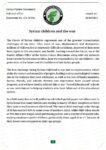Childhood and Smartphone Use

Smartphones have become an integral part of our daily lives, influencing not only adults but also reaching into childhood stages. This article unveils important aspects of how smartphones affect children!
Excessive use can impact their cognitive development according to various medical and psychological studies, reducing their ability to think critically and engage socially. Children’s smartphone usage often comes at the expense of time that should be spent interacting with peers and learning from experiences.
Notably, excessive use before bedtime can affect children’s sleep quality, and prolonged sitting in front of screens may lead to decreased physical activity and increased back and neck problems.
Furthermore, over-reliance on smartphones leads to children’s disconnection from the real world, interacting only with screens, gradually changing their behavior to become more introverted and isolated.
Negatives of Unconsidered Smartphone Use on Children:
Several studies have highlighted multiple negatives of unconsidered smartphone use by children, including:
- Weakening in performing basic skills like reading, writing, and arithmetic.
- Exposure to misleading information, making it hard for children to distinguish correct from incorrect information. At their sensitive age, they may acquire misleading knowledge, considering it correct, which could be harmful in some way, affecting their entire life path.
- Diminishing the role of the teacher as a primary source of knowledge and learning.
- Health impacts, such as back pain and reduced physical activity.
- Exposure to age-inappropriate advertisements, which could be psychologically shocking.
- Early boredom from their families, comparing them to celebrities seen on social media.
Age Consideration:
The impact of children’s use of modern smartphones and the internet may vary based on age and psychological development, summarized as follows:
- Young children (under 2 years old) should not be directly exposed to digital screens, with a preference for real-world interactions and creative play.
- Toddlers (ages 2 to 5) should be provided with age-appropriate digital content under direct supervision, limiting screen time and directing them towards physical and social activities.
- Older children (ages 6 and up) should have a balance between smart device use and other activities, with set restrictions on device use and gradual awareness of the issues they follow, encouraging reading and outdoor play.
Educational Tips:
Al-Shafi’i said: If you do not occupy yourself with goodness, it will occupy you with evil. Therefore, parents should fill their children’s time with beneficial games and activities, some of which are:
- Puzzle games: Image pieces to be reassembled, puzzle games with specific content, and freeze games with music or videos pausing suddenly, requiring children to freeze.
- Reading: Encouraging age-appropriate book reading, placing enjoyable reading content throughout the home, memorizing the Quran, hadiths, poems, and strengthening their memory and cognitive development.
- Manual activities: Making bracelets or logos with beads, painting on sand or wood, using paint to decorate clothes, and making fun shapes with clay.
- Group games: Hide and seek, math and intelligence games, rope pulling and jumping games.
- Smart devices: Using smart devices for early learning through educational programs suitable for each age, with necessary content monitoring.
Finally, our goal should be to achieve a healthy balance between technology use and other activities, ensuring good mental health for children of all ages. We recommend balanced and responsible phone use, with parents playing an active role in guiding their children’s smartphone use and offering healthy, interactive alternatives to enhance their mental and social development.
Imane Al-Mohammad
Family Affairs Office
Research and Studies Department
Articles
Syrian Future Movement (SFM)





